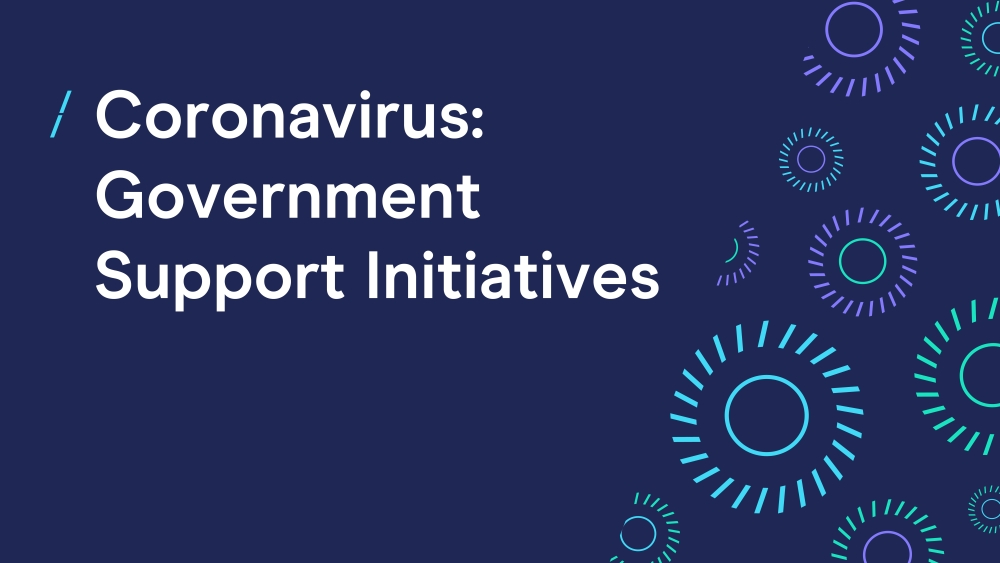Coronavirus: Government Support Initiatives
23 Mar 2020

On this page, you will find a list of the measures announced by the Government from Monday 16 onwards to aid the economy during the coronavirus outbreak.
Click here to access the DMA's coronavirus advice and help page which details information about accessing these measures.
Announced 26 March:
- Self-employed income support scheme announced. This is a taxable grant which will give self-employed people 80% of their average earnings over the past three years up to £2500. This will be available to people who are already self-employed (those who have a 2019 tax return). Self-employed people can also access business interruption loans and access income tax deferral schemes.
Announced Monday 23 March:
- Department for Health and Social Care, launched the ‘Techforce19’ challenge aims to support those who need to stay at home for several weeks. Up to £25,000 per company is available. Read more here.
Announced Friday 20 March:
- The Chancellor announced a Coronavirus Job Retention Scheme for which every business is eligible. The Government will cover 80% of employees wages up to £2,500 p/m. Employees will be kept on the company payroll even if they are not working. This will also cover backdated wages to March 1. The Chancellor has announced that this scheme will run for at least 3 months and will be extended if necessary. The first payments are expected by the end of April.
- VAT will also be deferred until June, meaning businesses will not have to pay VAT from now until the end of June. Businesses will have until the end of the Tax Year to repay.
Announced at Tuesday 17 March Coronavirus update:
Following the Government's initial response to the coronavirus response, the Chancellor of the Exchequer, Rishi Sunak, today announced a package of £330bn (the equivalent to 15% of UK GDP) further help for businesses.
- The Government and Bank of England will launch a business interruption loan scheme will allow any business to access up to £5m (up from £1.2m as announced last week)
- Large firms will be offered liquidity support, with a new scheme being launched by the Bank of England to help them bridge Coronavirus disruption to their cash flows through supply of loans
- The Chancellor is being given legal power to take new extraordinary measures of economic intervention
- For airlines and airports and other greatly affected industries, a special package of measures will be launched in the coming days to support them
- For businesses with no insurance against pandemics (pandemics are not commonly covered in interruption insurance at present), cash grants of up to £25k will be available to any business worth up to £51k
- The business rates holiday previously offered to businesses with ratable value of £51 or less will be extended to all businesses
- Cash grants offered to small businesses of £3k will be increased to £10k
- Devolved administrations will receive at least £3.5bn to support their economies
- Mortgage lenders will now instigate a 3-month mortgage holiday
Rishi Sunak will outline further measures in regard to workers' pay in the coming days. The Chancellor says 'anything that is necessary' to help the economy will be done.
Announced in Monday 16 March's Budget:
For small businesses
- A coronavirus loan scheme is to be introduced to cover the cost of salaries and bills will offer loans of up to £1.2m to support small and medium-sized businesses. The Chancellor said: "The government will offer a generous guarantee on those loans, covering up to 80% of losses, with no fees, so that banks can lend with confidence".
- Business rates abolished for one year for every business with value under £51k, worth up to £25k per business.
- £3000 cash grant per small businesses that would be eligible for the small business rates relief to cover losses, wages and any extra costs.
If you or your employees have to self-isolate (even without symptoms) or become ill
- Statutory sick pay will be paid from the first day, not day four as normal. This means people anyone ill or self-isolating will be able to claim £94 per week to make up for lost wages.
- For self-employed people, benefits will be available from day 1 of illness or self-isolation. The minimum income floor for universal credit will temporarily be removed (meaning anyone will be able to claim universal credit). Rules requiring people to go to job centres will also be relaxed.
- If you are an employer with less than 250 employees, the government will fund statutory sick pay for two weeks.
In total, the measures are worth £30bn.
To read about the rest of the budget and what it means for the data and marketing industry, click here.

Please login to comment.
Comments